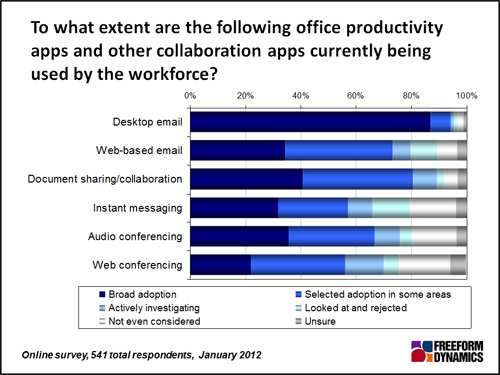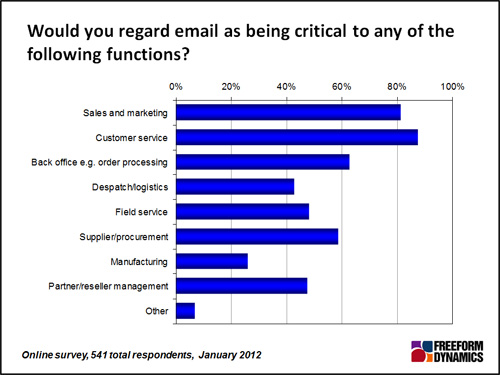By Tony Lock
Over the course of the last year or two an assertion has started to be heard that email is becoming less relevant in the modern, “social networking” age. In a world where social websites such as Facebook grab considerable attention and when organisations are encouraged to communicate with all and sundry via sites such as Twitter and LinkedIn, many now seem to be seriously questioning the importance of email in everyday business activities.
Despite the rhetoric from social enthusiasts, it will come as no surprise to any IT professional or business worker that email continues to be widely deployed in the vast majority of organisations. A quick glance at some recent survey results, Figure 1, indicates that the adoption and usage of email is extremely high, with well over nine out of ten organisations utilising desktop based email tools, and almost four out of five making use of web-based email – and that’s without counting the increasing number of users who access their inbox from either a tablet or a smartphone.

Figure 1
Email is thus deeply woven into business life. It is even fair to state that in the usually fragmented Universe of IT technology adoption, the use of email is probably as close to universal as any solution.
But just how “valuable” is email to business operations? This is an important question that business and IT people rarely consider.
The very fact that email is so widely used by almost every department in organisations has in many ways reduced its visibility. Indeed, until the email system stops working, it is very easy to take it for granted. Ironically the frequent difficulties users have with accessing their inboxes from smart phones, tablets and other devices in particular has actually raised awareness of how reliant on email we have all become. In many organisations the days when only a few senior managers had access to email whilst on the move are rapidly coming to an end, which can mean a lot of helpdesk calls coming in within minutes, or even seconds, when email messages stop flowing.
The very ubiquitous nature of email usage has lead over time to it being integrated into a very wide range of business activities critical to the organisation’s daily operations. In many instances email has become a major component in business processes by stealth rather than structured design. People are very comfortable with the solution, even if many may, on occasion, find fault with some of the applications they use to access their inboxes and message stores.

Figure 2
The widespread importance of email in almost every area of business is reflected in Figure 2. This not only reflects its importance but also indicates that any attempt to move away from email will take time, effort and money. Changing the way in which business processes operate, and/or the systems that underpin them, is not something you undertake lightly, especially when large user populations are involved.
Tampering with such fundamental business mechanics requires a clear view of the benefits, security and governance risks to be assessed, and business cases to be made. And when business processes touch external bodies, for example customers, suppliers and partners and generic B2B communications, the difficulty associated with change can become even more difficult to overcome unless there are very obvious advantages to be had.
To date there have been relatively few opportunities identified where the adoption of new “social” platforms offers a viable alternative to email. After all, how many of your suppliers would be happy to act on a purchase order placed on a public community site without robust verification being in place? Would you?
Beyond day-to-day messaging, with email file stores now routinely offering several Gigabytes of storage capacity, it is now common for users to employ their email system as a convenient place to keep files. The fact that many email systems offer reasonable search capabilities is one factor in this usage pattern. The significant proportion of documents that routinely arrives via ones inbox adds to its attractiveness.
In many organisations email has also surreptitiously established itself as the de facto collaboration tool and content management system of choice, complete with date stamping and versioning! The appeal here being further enhanced as email is accompanied by a simple way to “synchronise” important documents between the expanding portfolio of devices users expect to employ.
Today email is still firmly embedded in business and thus far shows little sign that its importance is diminishing in the vast majority of organisations. Like the Mainframe, tales of the demise of email are extremely premature and exaggerated. If past experience is any guide, the likelihood is that email will be with us for a very long time, and is more likely to be used in tandem with social platforms rather than be superseded by them.
CLICK HERE TO VIEW ORIGINAL PUBLISHED ON

Tony is an IT operations guru. As an ex-IT manager with an insatiable thirst for knowledge, his extensive vendor briefing agenda makes him one of the most well informed analysts in the industry, particularly on the diversity of solutions and approaches available to tackle key operational requirements. If you are a vendor talking about a new offering, be very careful about describing it to Tony as ‘unique’, because if it isn’t, he’ll probably know.



Have You Read This?
Generative AI Checkpoint
From Barcode Scanning to Smart Data Capture
Beyond the Barcode: Smart Data Capture
The Evolving Role of Converged Infrastructure in Modern IT
Evaluating the Potential of Hyper-Converged Storage
Kubernetes as an enterprise multi-cloud enabler
A CX perspective on the Contact Centre
Automation of SAP Master Data Management